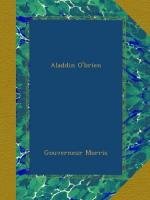Men came and sat with them, and Aladdin discovered in himself what he had hitherto never suspected—the power of becoming heart-to-heart friends with strangers in two seconds.
Aladdin was never able to remember just how or when or with whom they left the Boat Club. He only remembered walking and walking and talking and talking, and finally arguing a knotty question, on which all defended the same side, and then sitting down on the steps of a house in a low quarter of the town, and pouring the ramifications of all his troubles into the thoroughly sympathetic if somewhat noncomprehending ears of Beau Larch. He talked long and became drunker as he talked, while Larch became soberer. Then Aladdin remembered that the door at the top of the steps had opened, and a frowzy head had been stuck out, and that a brassy voice, with something at once pathetic and wheedling in it, had said:
“Aren’t you coming in, boys?”
Then Aladdin remembered that Beau Larch and he had had angry words, and that Beau Larch had told him not to make an ass of himself, and for heaven’s sake to go home. To which Aladdin had retorted that he was old enough to know what was good for him, and hated the world and didn’t give a damn who knew it, and wouldn’t go home. Aladdin could swear that after that he only closed his eyes for a second to shut out something or other, and that when he opened them, the reverberation of a door closing was in his ears. But for all that Beau Larch had gone, and was to be seen neither up the street nor down. Although his own was past mending, Beau Larch, drunk as he was, had done a good deed that night, for he had guarded a precious innocence against the assaults of a drunken little Irish boy who was feeling down about something—a girl named something or other, Beau Larch thought, and another boy named something or other. The next day Beau had forgotten even that much.
Aladdin thought that Larch was hiding in jest. He arose unsteadily and wandered off in search of him. After a time he found himself before the door of his own house. There were lights in the parlor, and Aladdin became almost sober. He realized with a thrill of stricken conscience that Mrs. Brackett was sitting up for him, and he was afraid. He tried the front door and found it unlocked. He went in. On the right, the door leading into the parlor stood open. On the table burned a lamp. Beside the table in the crushed plush rocker sat Mrs. Brackett. Her spectacles were pushed high up on her forehead. Her eyes were closed, and her mouth was slightly open. From the corners of her eyes red marks ran down her cheeks. Her thin gray hair was in disarray. In her lap, open, lay her huge family Bible; a spray of pressed maidenhair fern marked the place.
Aladdin, somewhat sobered by now, and already stung with the anguish of remorse, tiptoed into the parlor and softly blew out the light; but the instant before he did so he glanced down at the Bible in the good lady’s lap and saw that she had been reading about the prodigal son. Great tears ran out of Aladdin’s eyes. He went up-stairs, weeping and on tiptoe, and as he passed the door of his brother’s room he heard a stir within.




